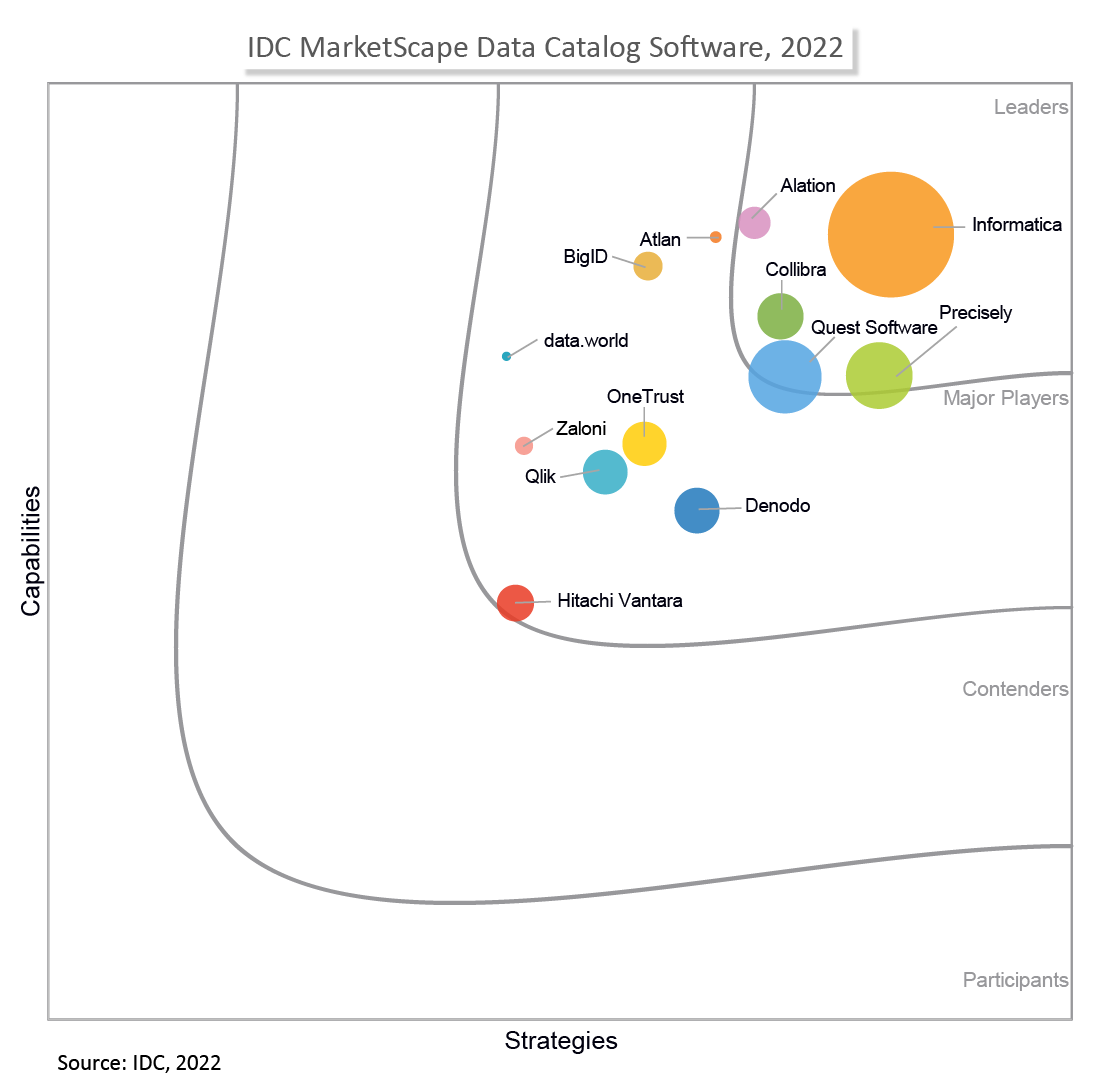Informatica Recognized as a Leader in the IDC MarketScape for Data Catalogs

IDC recently released their second IDC MarketScape: Worldwide Data Catalog Software 2022 Vendor Assessment. We are excited and honored to report that, once again, Informatica has been named a Leader!
This announcement follows these other recent achievements as a market leader in the data catalog solution space:
- Named an Overall Leader for data catalog solutions in the KuppingerCole Leadership Compass Data Catalogs and Metadata Management Report
- Recognized as a Leader in The Forrester Wave™: Enterprise Data Catalogs for DataOps, Q2 2022 report.
According to the IDC MarketScape, data catalog solutions leverage metadata “to enable people, processes, and technology with trustworthy and reliable data in delivering better business outcomes, controlling data in and across the enterprise, and enabling self-service access to data.” All of these capabilities drive substantial value for organizations. For this IDC MarketScape report, IDC developed a comprehensive evaluation of all data catalog vendors. This evaluation included critical capabilities such as metadata capture, collaboration and crowdsourcing, and AI/ML-based automation. Other factors included platform strategy, cloud service availability, market presence and customer satisfaction.
The IDC MarketScape named Informatica as a Leader, showing how well our data catalog capabilities align with the IDC MarketScape’s evaluation requirements. Below, we’ll describe some of these key capabilities in more detail.
Essential Data Catalog Capabilities Highlighted by IDC MarketScape
These are the important criteria IDC uses to evaluate the strength of each vendor in the assessment. The IDC MarketScape recommends that you use similar criteria to evaluate data catalog solutions for your organization’s needs:
Broad and Deep Metadata Connectivity
Better data catalog solutions won’t limit you to one environment or vendor solution. To enable data intelligence, they should have broad and deep metadata connectivity. This connectivity should align with your data landscape and span a variety of multi-cloud and on-premises sources. You should be able to capture detailed metadata via an automated process that requires minimal manual effort. This is true of the Informatica data cataloging solution, Cloud Data Governance and Catalog. This solution lets you extract metadata from a variety of locations. These locations include cloud platforms, BI tools, databases, multi-vendor ETL and data science tools. You can also extract from various enterprise applications and file formats, SQL dialects, and stored procedures.
AI/ML-powered Automation
To manage and govern large data estates, you need automation. Informatica’s data cataloging solution employs machine learning and other AI techniques. This can help you with tasks such as:
- intelligent domain and entity recognition
- automated data profiling
- classification across structured and unstructured data assets
- automatically associating glossary terms to data
- inferring relationships such as joins among datasets to accelerate data curation at scale
End- to-End Data Lineage
Automated comprehensive data lineage is a must-have capability for any data-driven organization. Data lineage improves transparency and increases trust in the data being used for business-critical insights. A data catalog solution should also be able to obtain data lineage metadata from sources outside the platform. Cloud Data Governance and Catalog allows users to derive end-to-end data lineage across a vast amount of disparate data sources and even parse SQL scripts, stored procedures and AI/ML code to automatically gather transformation details.
Collaboration and Crowdsourcing
The IDC MarketScape notes that modern data catalogs “enable the capture of tribal knowledge through crowdsourcing.” Data catalogs make it easier for stakeholders to collaborate on data enrichment, data discovery and data curation with assists from crowdsourced tags, annotations, ratings and reviews. By harnessing the combined power of AI, human expertise and collaboration, data catalog solutions provide the context that users need to use data with confidence. This greatly increases the value of the data throughout your organization and makes it simpler for users to find the most relevant and trusted data for analytics.
Scalability and Flexibility
A primary benefit of having a cloud-native data catalog solution is access to infrastructure at the scale you need when you need it. Informatica also offers consumption-based pricing, so organizations pay only for what they use. This means our customers can accommodate evolving business requirements without locking in costs. Cloud Data Governance and Catalog makes it easy to onboard new capabilities as you need them.
Ability to Catalog Analytic Assets
As the IDC MarketScape notes, “Data cataloging is not just about the data, but it needs to include analytic assets too.” Informatica’s solution allows users to catalog and govern data assets including AI models. Users can track information and gain insights into the models and their outputs. These insights include metrics such as data drift to assess changes to the model’s prediction capability.
Learn more about Informatica’s perspective regarding key capabilities to consider in a data catalog. Download our eBook: Drive Your Business Forward with a Catalog of Catalogs.
Why is Informatica a Leader?
The IDC MarketScape also noted three additional major strengths:
1. “One common metadata foundation”: “Informatica's Intelligent Data Management Cloud portfolio of capabilities leverages one common foundation of metadata, captured and generated within the platform whenever data is moved, transformed, cleansed, controlled, and managed throughout its life cycle. Informatica's core central intelligence engine (CLAIRE) learns from this common foundation of metadata to automate data intelligence, integration, management, and governance activities.”
2. “Cloud”: “Informatica supports multiple deployment patterns across all major hyperscale platforms. The Intelligent Data Management Cloud is available as a service, including some serverless functions, managed by Informatica. It can also be deployed and managed by a customer on its cloud infrastructure of choice, or it can be deployed on-premises.”
“Market presence”: “Informatica has the largest share of revenue in the overall data integration and intelligence software market as defined by IDC. Informatica also has the largest share of revenue in the metadata management and data intelligence submarkets, as reported in Worldwide Data Integration and Intelligence Software Market Shares, 2021: Accelerated Growth in a Digital-First World (IDC #US47920522, June 2022).”1
IDC considers data catalog software to be a subset of the larger data intelligence software market. They define it as “the cornerstone of data intelligence, providing users with technical, business, lineage and behavioral intelligence about data being managed by the organization.”
Informatica Cloud Data Governance and Catalog is one component of a single, unified solution for predictive data intelligence. It offers integrated data governance, catalog, data quality and data marketplace capabilities, powered by broad and deep cloud-native metadata intelligence. Data-driven organizations can deliver personalized insights with predictive recommendations and automation, while empowering data consumers through a self-service data shopping experience that includes automated data delivery. This allows you to:
- Accelerate and automate data governance to deliver trusted data
- Enable data sharing programs that empower data consumers to engage with data
- Drive analytics and business outcomes with trusted data
For More Information
- What is data catalog?
- Read the IDC MarketScape: Worldwide Data Catalog 2022 Software Vendor Assessment excerpt
- Review these reports to read more about our market-leading data catalog solution:
- Join us for a live demo to see Cloud Data Governance and Catalog in action
IDC MarketScape vendor analysis model is designed to provide an overview of the competitive fitness of ICT suppliers in a given market. The research methodology utilizes a rigorous scoring methodology based on both qualitative and quantitative criteria that results in a single graphical illustration of each vendor’s position within a given market. The Capabilities score measures vendor product, go-to-market and business execution in the short-term. The Strategy score measures alignment of vendor strategies with customer requirements in a 3-5-year timeframe. Vendor market share is represented by the size of the icons.
1Worldwide Data Integration and Intelligence Software Market Shares, 2021: Accelerated Growth in a Digital-First World, Stewart Bond, https://www.idc.com/getdoc.jsp?containerId=US47920522








